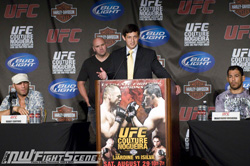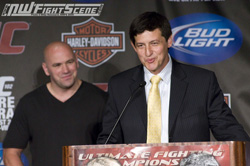|

Executive
Director of the Oregon State Athletic Comission, Brad
Darcy, spoke with NW Fightscene after the UFC 102
pre-fight press conference and touched on a number of
subjects including the UFC to coming to Oregon for the
first time, Oregon's drug testing program, and the budget
challenges the Commission faces...
NW
Fightscene: Tell us about the negotiations with the UFC
in getting them here. How did that go? Were there any stumbling blocks
there?
Brad Darcy: Well I'm not sure I'd use the term negotiations. I mean as much as we prepare ourselves
for the possibility of the UFC happening here and hope that it does, and all the economic impact this will have on an area like
Portland, we don't offer really anything incentive-wise,
other than to offer
to do our best regulating the event. In terms of our interactions with the
UFC, they've
just been real excellent, professional and cooperative
on all the preparation that goes into an event like this. On that front it's been great, a good experience.
NWFS:
About the officials, the judges... Is it going to be local
guys or is it going to be guys coming in from out of
state?
Darcy: It will be a combination of both actually. This
card presented some things to consider in terms of
that it does actually consist of fighters with local
ties... The Commission is trying to consider perception issues. Ultimately my goal is to get the best team of officials I can, from top to bottom of
the card. So our officials list does include representation of Oregon officials as well as a lot of the same people you'd see at the events wherever
they go.
NWFS: My next question is about drug
testing. Have you instituted a program and what does it
involve?
Darcy: Yes, we will be testing of course for this event. I'm trying to think of a model.. I'd say we
probably closely mirror Nevada, New Jersey in terms of how we're
going to go about testing. It probably wouldn't be a good idea to get into a lot of detail prior to the event, but
we will do some testing for both drugs of abuse and performance
enhancing drugs as well.
NWFS: Is this the first event that
you doing drug testing for?
Darcy: It's the first one in some time, yes. We've not done it in recent years. A lot of that is because
there is a policy historically to not test amateur Mixed
Martial Arts fighters. And the majority of the fights that take place in Oregon right
now, more than half are amateur fights. We also have limited resources
as a Commission. Technically, we have the authority to pass the
expense on to the fighters, just make them pay for their own tests. And in some states, I'm sure
[they] do that. Our philosophy has been to absorb that expense unless you test
positive. Then that may be part of a punitive act if you do end up being positive. So there are some challenges to it. But this
event was the obvious good place to resume that.
NWFS: How is the state looking at your
program? Are they liking what you're doing? Are you
getting any feedback from the legislature at all?
Darcy:
I think that there is a sector there that's probably a cross-section representative of a typical population. There are those
detractors of course that are lawmakers that would rather
this activity not be lawful. Then on the other hand there
are strong proponents of it. And then everyone else in the middle. And so generally the reply back
from lawmakers has been, regardless of what your take is on whether it should happen and if it should be advocated, it needs to be effectively regulated if it is going to take place. So that's kind of been the response back from legislature.
NWFS: Are you self-sustaining with the fees that you get from
events?
Darcy: No, and that has been a challenge. Our budget does not include any general funds of tax dollars.
So we are completely dependent upon taxes and fees. So an
event like this of course is going to pay a proportionally higher amount of our budget
than smaller events. So frankly with them coming here, the likelihood of us being
self-sustained in actuality goes up, almost all on their own. We run
on a biennium budget here in Oregon, and it's just been a real challenge. We used to collect taxes against pay-per-view
revenues and that was found unconstitutional. So we went from a situation where we were having 5 or 6
boxing shows a year and collecting a lot of money to what we are doing now, and collecting even less. And so it's difficult.
Many
thanks to Mr. Darcy for taking the time in granting this
interview.
Learn
more about the Oregon State Athletic Commission at their
website HERE

|










